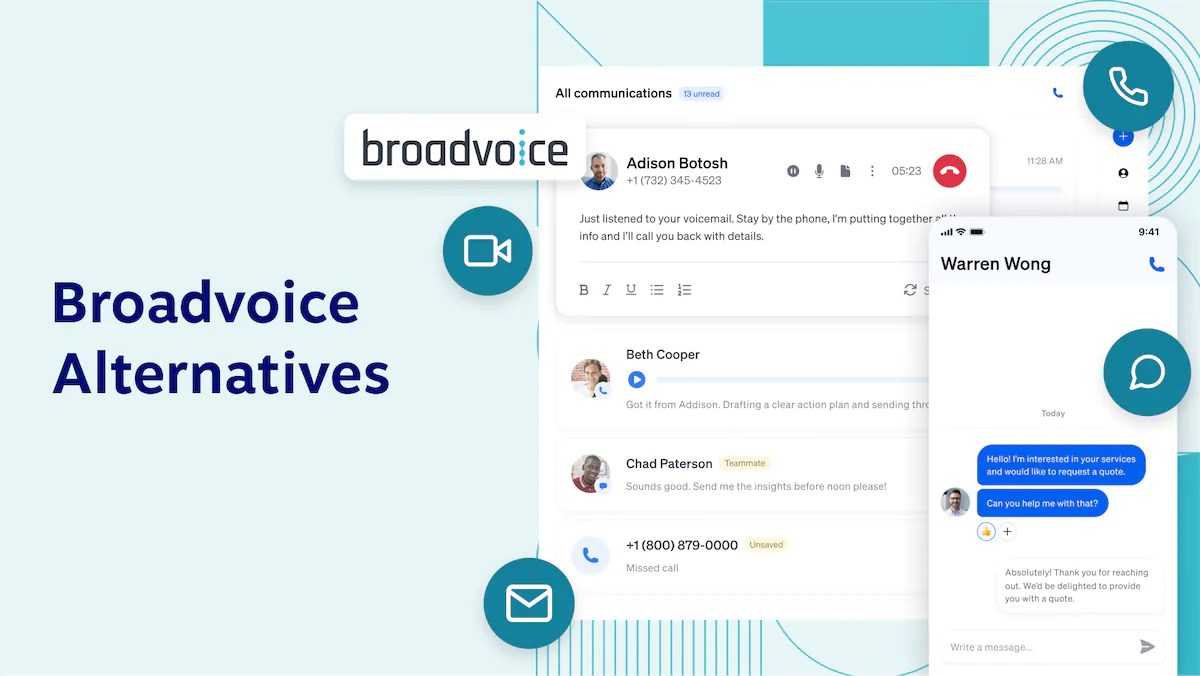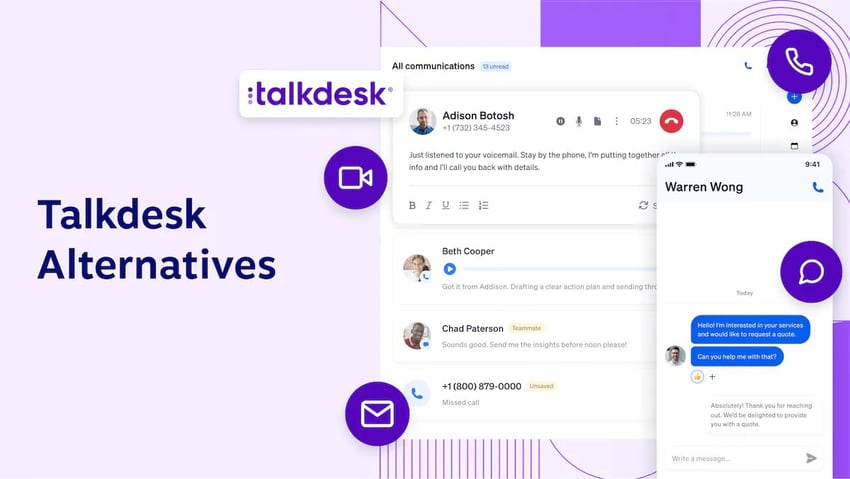Broadvoice is a cloud-based VoIP service for small and mid-sized businesses. Its offerings include unified communications as a service (UCaaS) and cloud PBX.
But Broadvoice might not be the best cloud contact center solution for some businesses despite its features. If this is the case for your company, you need to know what options exist on the market and how they stack up against each other to help you choose the right Broadvoice alternative.
What Are Some of Broadvoice’s Strengths?
Let’s look at some things users love about Broadvoice.
Cloud PBX services
The b-hive Communicator is Broadvoice’s cloud PBX application. It’s an all-in-one software solution with many features, including online faxing, voicemail, softphones, and remote office capabilities.
After logging in to this app, your team members can call from your phone system from anywhere with an internet connection. This is particularly useful for businesses with remote or distributed teams because employees can make and receive calls using their business phone numbers from any location.
SIP trunking
Not ready to move on from your legacy phone system yet? Broadvoice allows you to access limited cloud phone capabilities on your existing phone hardware.
Specifically, it offers SIP trunking features such as call recording, call analytics, and unlimited usage options. So, you get the flexibility of a cloud phone service without the cost and time involved in overhauling an archaic business phone system.
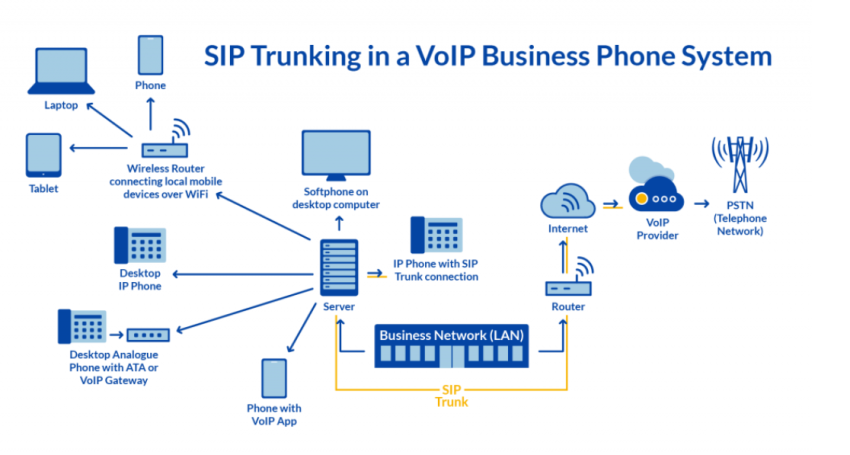
UCaaS features
Broadvoice has several unified communications features, including:
- A web-based communicator tool
- SMS and text messaging
- Advanced calling functions like call routing and queueing
- Call logs
- Voicemail and faxing
- Admin call center analytics
These UCaaS features enable businesses to power and control multichannel communications from a single platform to become more efficient.
Mobile apps
If you need to work on the go, you can download Broadvoice’s Android or iOS applications on your smartphone device. G2 reviews suggest that this is Broadvoice’s most helpful feature, although some users say the app can be pretty buggy:
“I love the b-hive app on my cell phone! I can use the app to answer incoming calls no matter where I am, as well as [make] outgoing calls showing our main number.”
Risk-free cancellation policy
You can cancel your Broadvoice subscription for free within 30 days and get all your money back, which makes up for the lack of a free trial or freemium experience. This policy is rare in the cloud communications space.
Why Customers Seek Alternatives to Broadvoice
Although it has appealing features, Broadvoice falls short in several areas.
Customer service issues
Customer support isn’t Broadvoice’s strong suit. Users complain of long wait times, unhelpful support agents, and unresolved support tickets, among other issues.
For example, one user said that the support team became nonchalant after he signed the contract, leaving him with a faulty business phone setup. And another user spent weeks waiting for feedback from the support team, only to finally receive incorrect information that did not solve their problem.

Reliability concerns
Broadvoice’s service quality frequently fluctuates. This manifests itself in several ways: pause and connection noises, call lagging, and interruptions during call transfers. For example, this user experienced poor audio quality and sudden call disconnections:
“We had issues with call quality. A lot of calls would cut out intermittently and sounded ‘choppy.’ On many occasions, we received feedback that it was hard to understand us when calling from Broadvoice. I understand internet issues could be involved, but we never had issues with other VoIP services on the same internet connection.”

Billing and account management
It is also common for Broadvoice users to experience billing discrepancies — either through multiple debits that aren’t refunded on time or payments that are not reflected in the system.
For example, Broadvoice abruptly shut down this user’s telephone service with little or no warning after the cloud service provider failed to renew his monthly subscription despite charging his card multiple times.
Poor user experience
It takes some time to learn how Broadvoice works, especially if you aren’t tech-savvy. And even when you’re up to speed, you might struggle with setting up certain features or understanding how specific aspects of the platform work.
For example, this customer had to switch to a different texting service after finding it difficult to use Broadvoice’s Communicator application. And the administration portal lacks call flow visual aids, which makes it hard to use.
In the App Store, Broadvoice has a 2.1 out of 5.0 score from its users.

Limited features
As you use Broadvoice, you’ll quickly discover that most of its features are limited — as this person did:
“Broadvoice’s call reporting is very limited, and the system doesn’t accurately account for calls transferred between users. Available SMS functionality can only be used by one user per phone number, making it impractical to manage in some cases. There aren’t available call queue options unless you upgrade to the premium contact center, which is available at a cost. Many providers offer an in-between option, but Broadvoice does not.”
6 Top Alternatives to Broadvoice
Want to switch from Broadvoice to another cloud-based VoIP service? Here are the best Broadvoice alternatives that are worth considering.
1. Nextiva
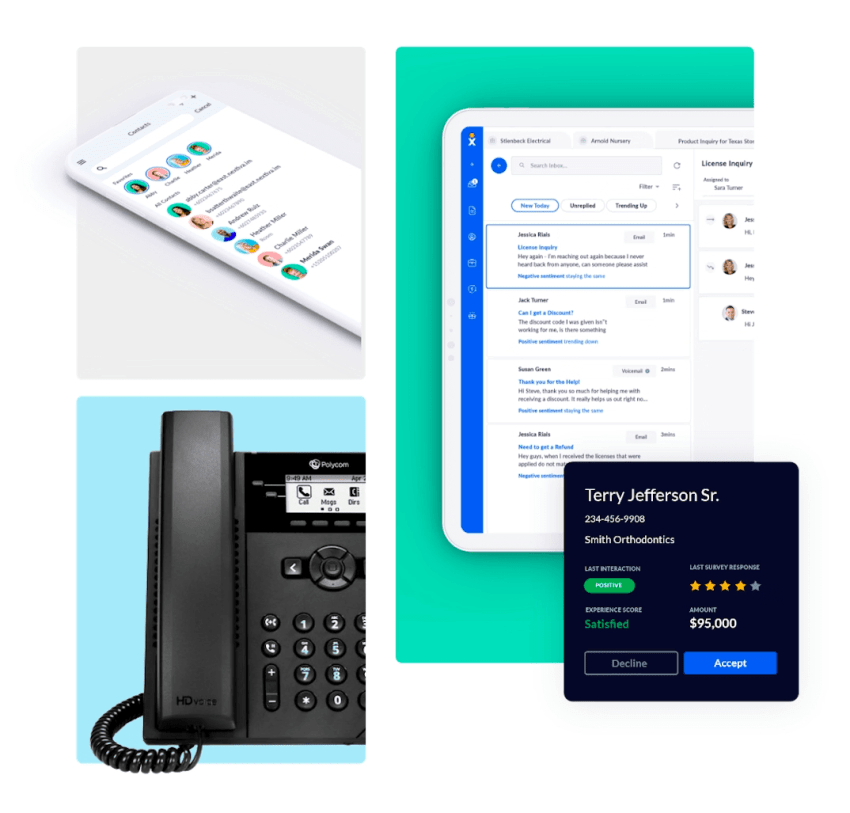
If you’re searching for a reliable and easy-to-use cloud communications solution for your growing business, Nextiva is definitely worth looking into.
It’s an AI-powered conversational platform integrating voice, video, and messaging services for all-in-one business communications. Nextiva’s features include advanced call management capabilities like call routing, IVR and call forwarding, CRM tools for customer personalization, and analytics.
You get A+ customer support, too. Here’s one user’s experience with Nextiva’s team.


2. Webex

Powered by Cisco, Webex is a collaboration tool for small and growing businesses. Its features include high-definition video conferencing, omnichannel support, and integration with other Cisco products.
What users love most about Webex is its robust security capabilities. It offers end-to-end data encryption, device authentication, and data retention controls.
Webex has a free plan. It also has three paid plans, with the lowest tier priced at $14.50 monthly. Webex is worth checking out if your remote team prioritizes data security.
3. 8×8

8×8 caters to global businesses with advanced communications workflows. It offers unlimited voice calling to numerous countries, video conferencing, skills-based routing, and strong analytics capabilities.
Despite these features, 8×8 seems to be missing some key contact center capabilities. For example, this user said that the meeting and chat functions are basic. And another struggled to download call recordings.
8×8’s global reach and scalability make it a great choice for businesses with an international presence or those planning to expand. You can choose from one of its five plans. Pricing isn’t available on its website, so you must contact the company for a customized quote based on your business needs.
4. GoTo Connect

Formerly known as Jive, GoTo Connect is an easy-to-use cloud phone system with voice, video, and messaging capabilities. Its top features include customizable call routing, unlimited call queues, and an extensive integrations library.
What users love most is its user-friendly interface and flexibility. According to one customer, it’s really easy to change call flows and add out-of-office messages on the platform without needing help from the support team.
GoTo Connect has two plans that cost $29 per user per month and $39 per user per month. It’s suitable for businesses that don’t want to be held back by unnecessary phone service complexity.
5. CloudTalk
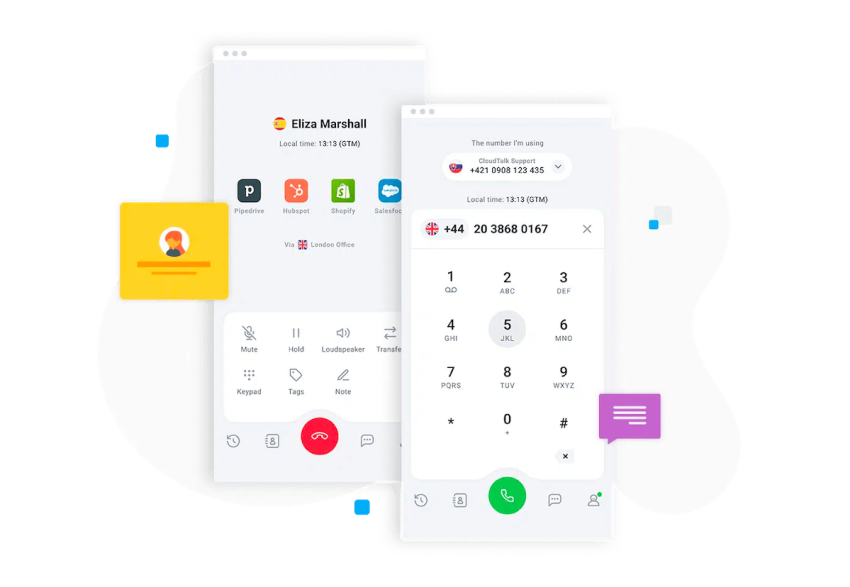
CloudTalk is a popular VoIP option for sales and customer support teams because of its CRM integration capabilities. You can sync the phone with HubSpot to get up-to-date customer data for more personalized calls. This integration comes with a one-click option that enables your sales and support agents to make calls directly from HubSpot.
CloudTalk has other customer-centric features like advanced call routing, ring groups, and call recording. It has four pricing plans, including the Starter Plan, which costs $25 per user per month. Or you can contact the company for a tailored plan designed for your specific business use case.
One thing to keep in mind is that CloudTalk often gets buggy. Users complain about random account logouts and app glitches.
6. Ooma
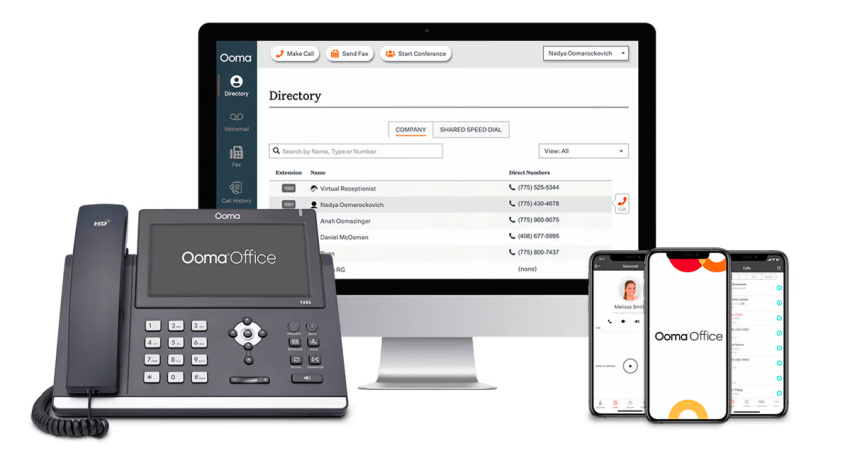
Ooma is ideal for small businesses looking for an affordable, uncomplicated phone system. It offers more than 50 standard features, including call transfer and forwarding, virtual fax, and call logs.
Ooma has three business phone plans: Essentials, Pro, and Pro Plus. Pricing for the Essentials Plan starts at $19.95 per user per month. This plan gives you access to Ooma’s standard features and specialized capabilities like a virtual receptionist and mobile app support.
Its customer service team is pretty responsive. According to this user, “The best thing about Ooma is the great and helpful customer service. Every time I have a problem, the customer service department is there to help and provide support.”
Ooma might be worth exploring if you’re looking for a simple, cost-effective small business phone service that gets the job done.
Nextiva vs. Broadvoice: Cloud PBX Pricing
It’s important to note that all of Broadvoice’s pricing plans are based on three-year contracts.
In contrast, Nextiva offers flexible plans with pricing that depends on the number of users and the duration. This is ideal for organizations that do not want to be locked into strict business phone contracts.
With Nextiva, you can go month to month for the ultimate flexibility or a multi-year agreement for the most competitive price.
For a little bit more budget, your team gains advanced cloud PBX features like team collaboration, video and audio meetings, and free local and toll-free numbers, which Broadvoice’s plan doesn’t offer.
The Verdict: Nextiva Wins
You get decent cloud communications features and pricing with Broadvoice. But upgrading to Nextiva gives you access to top-notch customer support, all-in-one UCaaS features, and an intuitive interface that’s easy to understand and use.
Most importantly, you’ll be using a streamlined, integrated contact center solution that scales as your business grows. Say goodbye to switching software solutions every few years.
See why over 150,000 businesses made the switch. Learn how much of an impact Nextiva made on Austin Zoo in the video below.

Your PBX doesn’t have to be complex.
See why 150K+ brands simplify their business communications with Nextiva.


















 VoIP
VoIP 

